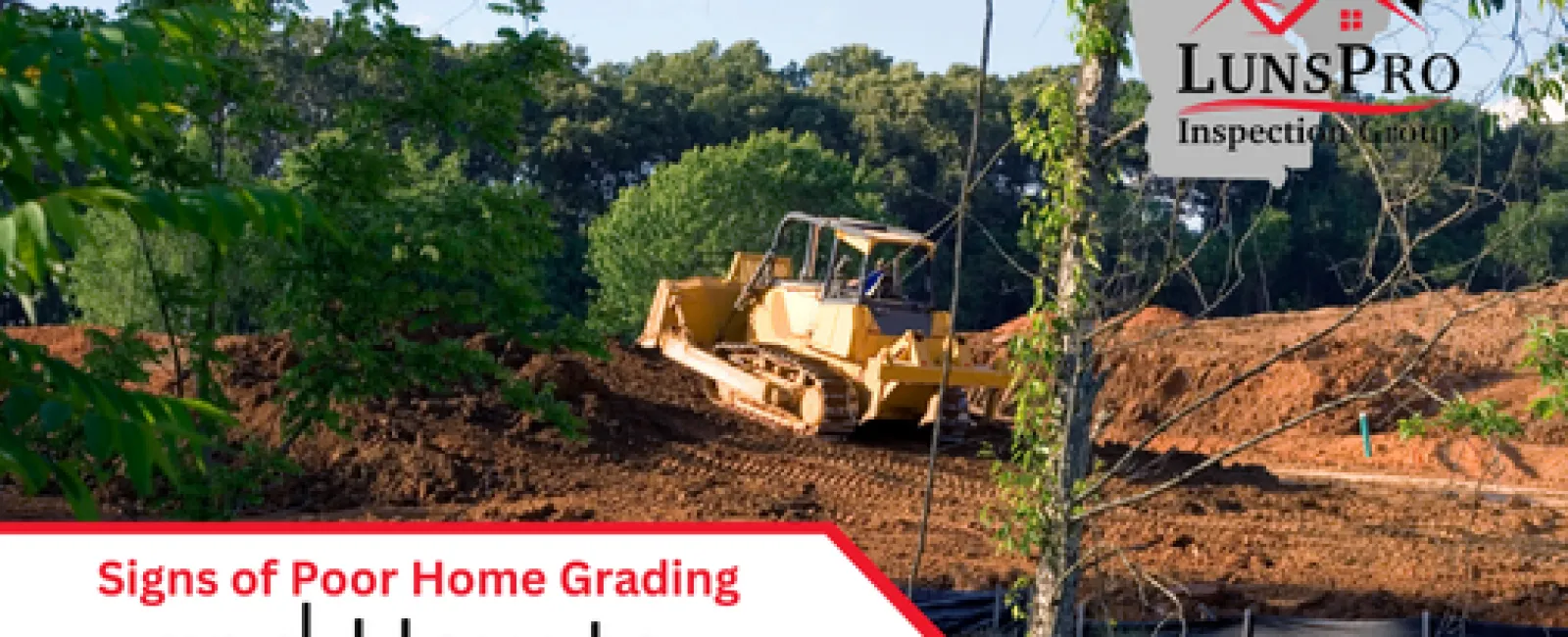The grading around your home is essential to maintaining its structural integrity and functionality. Poor grading can cause various problems, from water pooling near the foundation to severe structural damage. Often overlooked by homeowners, addressing grading issues early can help prevent costly repairs and unnecessary stress. At LunsPro Inspection Group, we emphasize the importance of understanding grading issues and taking corrective measures to protect your home.
In this guide, we'll discuss the most common signs of poor grading, its potential impact on your property, and the steps you can take to improve it. Through professional Atlanta residential and commercial inspections, we've seen firsthand how addressing grading issues can safeguard homes in the region.
What Is Home Grading and Why Is It Important?
Home grading refers to the slope of the land surrounding your property. Ideally, the ground should slope away from your home to divert water from the foundation, reducing the risk of moisture intrusion and related issues. Proper grading safeguards your home's structural integrity while promoting a safe and functional outdoor space.
Why Proper Grading Matters
- Prevents Water Damage: Proper grading channels rainwater and runoff away from the home's foundation.
- Protects the Foundation: Excess moisture around the foundation can lead to cracks, settling, or shifting.
- Reduces Flooding Risks: Inadequate grading increases the likelihood of basement flooding and water pooling in low-lying areas.
- Preserves Landscaping: Excess water from poor grading can erode soil and damage plants or hardscaping features.
Signs of Poor Home Grading
Recognizing the signs of poor grading early can help prevent serious and costly damage to your property. Here are the most common indicators to watch for:
1. Water Pooling Near the Foundation
One of the most obvious signs of poor grading is water accumulating around the base of your home. After heavy rains, check for puddles or standing water near your foundation walls.
2. Basement Leaks or Flooding
Improper grading can cause water to seep into your basement or crawl space, resulting in dampness, musty odors, or visible flooding.
3. Cracks in the Foundation
Excess moisture from poor grading can put undue pressure on your foundation, leading to cracks or structural instability.
4. Soil Erosion
If you notice areas of your yard where soil is washing away, this could be a sign that water runoff is not being properly directed.
5. Soggy or Uneven Lawns
A persistently wet or uneven lawn, especially near the house, often indicates improper drainage due to poor grading.
6. Gutter Overflow
When water from your gutters spills over, it may indicate an issue with grading or drainage that prevents proper water flow away from the home.
7. Visible Sloping Towards the Home
If the ground visibly slopes toward your home, it's a clear sign that regrading is needed to prevent water from flowing toward the foundation.
How Poor Grading Affects Your Home
Neglecting grading issues can lead to a range of problems that impact your home's safety, comfort, and value:
1. Foundation Damage
Constant exposure to moisture weakens the foundation, causing cracks, settling, or even structural failure over time.
2. Mold and Mildew Growth
Moisture intrusion into basements or crawl spaces fosters the growth of mold and mildew, which can harm indoor air quality and pose health risks.
3. Increased Pest Activity
Poor grading can create damp environments that attract pests like termites, ants, and rodents.
4. Landscaping Damage
Erosion from poor grading can destroy plants, damage retaining walls, and wash away mulch or topsoil.
5. Lower Property Value
Visible grading issues or water damage can deter potential buyers and reduce your home's resale value.
Improving Home Grading: Practical Solutions
If you've identified grading issues, addressing them promptly is crucial to protect your home. Here are some practical steps to improve grading around your property:
1. Conduct a Professional Inspection
Start by scheduling a professional Atlanta home inspection with experts like LunsPro Inspection Group. An inspection will help identify the severity of the issue and provide tailored recommendations.
2. Add Soil to Create Proper Slope
To improve grading, add soil around your foundation to create a slope of at least 6 inches over the first 10 feet. This ensures water flows away from the home.
3. Install Drainage Solutions
If grading alone isn't enough, consider installing drainage systems like French drains, swales, or catch basins to manage water flow.
4. Extend Downspouts
Ensure downspouts extend at least 5-10 feet away from the home's foundation to direct roof runoff safely away.
5. Address Soil Erosion
To prevent erosion, reinforce sloped areas with landscaping fabric, mulch, or vegetation. Ground cover plants with deep roots can stabilize soil effectively.
6. Repair Existing Damage
If poor grading has already caused damage to your foundation, basement, or landscaping, address these issues promptly. Work with professionals to repair cracks or waterproof your basement.
Preventive Maintenance Tips for Proper Grading
Once you've corrected grading issues, regular maintenance is essential to prevent future problems:
- Inspect Grading Annually: Check the slope around your home each year, particularly after severe weather.
- Keep Gutters Clean: Regularly clean your gutters to prevent overflow that can exacerbate grading issues.
- Monitor Landscaping: Avoid planting large trees or shrubs too close to the foundation, as their root systems can disrupt grading.
- Reapply Soil as Needed: Over time, soil can settle or erode, requiring periodic regrading to maintain the proper slope.
- Install Splash Blocks: Place splash blocks at the base of downspouts to minimize erosion and direct water flow.
Why Professional Inspections Are Key
While some grading issues may seem manageable, others require expert evaluation to ensure lasting solutions. Atlanta residential and commercial inspections by LunsPro Inspection Group can help identify hidden problems and recommend effective remediation strategies.
The Benefits of Professional Inspections
- Comprehensive Assessments: Inspectors evaluate grading, drainage, and related factors that affect your home's structural health.
- Accurate Diagnosis: Professional insights help pinpoint the root cause of issues, preventing costly trial-and-error fixes.
- Peace of Mind: Knowing your home is properly graded provides confidence in its long-term stability and value.
Protecting Your Home with Proper Grading
The grading around your home is more than just an aesthetic feature—it's a critical factor in protecting your property from water damage, structural issues, and other costly problems. Recognizing the signs of poor grading, such as water pooling, foundation cracks, and soil erosion, is the first step toward safeguarding your home's integrity.
Improving grading requires a combination of thoughtful planning, expert advice, and preventive maintenance. Whether it's adding soil, installing drainage solutions, or addressing existing damage, taking proactive measures ensures a safer, healthier home environment.
At LunsPro Inspection Group, we're committed to helping homeowners across Atlanta protect their investments through detailed Atlanta home inspections. By identifying grading issues and providing tailored recommendations, we empower you to make informed decisions about your property's care.
Don't wait for small issues to become major problems. Schedule an inspection with LunsPro Inspection Group today and take the first step toward a properly graded, worry-free home. Together, we'll ensure your property remains safe, functional, and beautiful for years to come.

